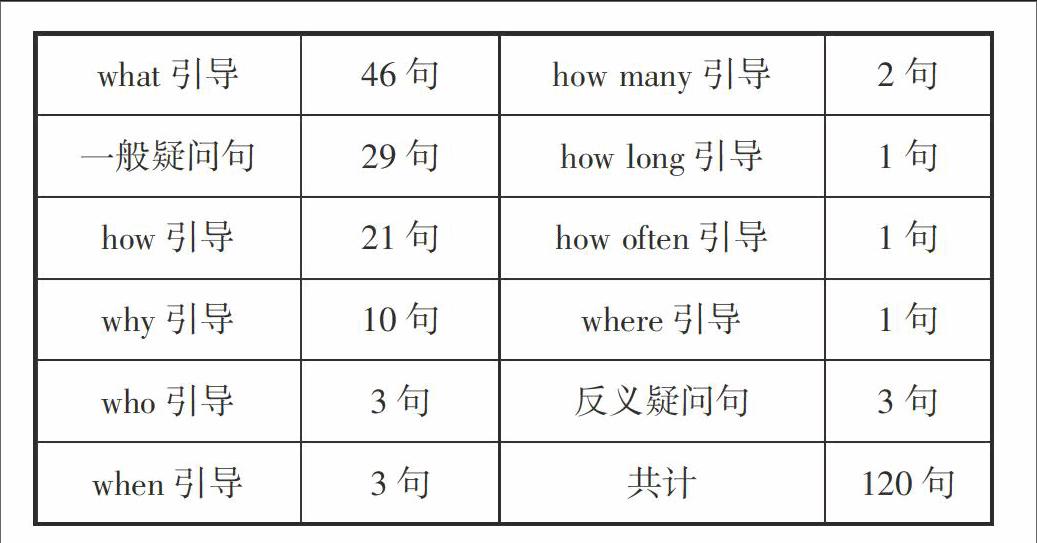角色扮演问句规律
2017-09-27罗丽雯
罗丽雯

语言本身变化万千,要说抓“提问”的规律似乎有点难。但从2011年至2017年中,笔者共能统计到的120句问句中,发现用what提问的频率最高,一共有46句,其次是一般疑问句,一共是29句,第三是用how提问(不包括用how long 或 how many等)共计21句。这三大类就占了96句。具体情况如下:
笔者曾经做过实验,在提问这一部分,不回答完整的句子,只讲疑问词以及相关的个别单词。如:
我们怎样去俱乐部呢?(How go to)
俱乐部什么时候开放呢?(When open)
明天我们在什么地方见面?(When we meet tomorrow,测试时口误了,where讲成when)
目的是测试一下,如果学生不懂回答正确的问句语序,能讲出正确的疑问词,外加几个常用的单词,电脑改分会给出怎样的分数。结果这三句笔者折算后的得分是0.9分,换算成原始分是3.6分(原始总分为6分)。
笔者大胆猜测电脑改卷,是将考生答案和正确答案进行比对,语序肯定会是作为评分的一项,但考生的回答能涵盖正确答案的单词应该是最重要的比对标准,所以请英语不好的考生不要放弃,找准疑问词,大胆开口讲,多争取一分是一分。
另外,在这120句问句中,也有一些结构或是短语甚至相同的问题,下面笔者将对“类同问句”进行归类。
一、do you think
“三问”是考查学生在交际中,能对外籍人士进行提问的能力。而我们向别人提问时,可能会提到对方对某事的看法,因此“do you think”以及问别人的看法的“What do you think of”这两个表达常常考到。
1. 你觉得我需要吃药吗?(2011)
Do you think I need to take some medicine?
2. 为什么你认为情节难以相信?(2012)
Why do you think the plot is hard to believe?
3. 你认为什么时候召集开会最好呢?(2013)
When do you think is the best time to hold a meeting?
4. 为什么你认为自己能成为语言教师?(2014)
Why do you think you can become a language teacher?
5. 你认为每个人都能被培训成好老师吗?(2015)
Do you think that everyone can be trained to be a good teacher?
6. 你认为体育活动将是一样的吗?(2016)
Do you think the sports will be the same in the future?
7. 你认为机器人有一天会取代人类吗?(2017)
Do you think robots will take the place of humans one day?
還有一句是问对方看法“你怎样看待……?”,这个问句,中文“怎样”二字易导致学生用how 提问,但英美人士一般是用“What do you think of ...” 如:
1. 你如何看待在英国排队的事情?(2011)
What do you think of queuing in England?
2. 你怎么看待穿校服?(2015)
What do you think of wearing school uniforms?
二、“What do you mean?”
1. 你说的学习风格是什么意思?(2011)
What do you mean by learning styles?
2. 你什么意思呢?(2011)
What do you mean?
3. 那是什么意思?(2016)
What does that mean?
4. 那是什么意思呢?(2017)
What does that mean?
三、“影响”
1. 谁给你们的影响最大?(2011)
Who had the biggest effect/ influence on you?
2. 颜色怎样影响我们的购买行为?(2014)
How do colors affect our buying decisions?
3. 颜色怎样影响我们的情绪?(2015)
How do colors affect our moods?
在高中阶段,“影响”的表达比较多,相关单词有influence, affect, effect等,其中affect, effect(affect sth, have an effect on sth)两个词用法容易混,而且读音更容易混。相比较influence既可当动词也可以当名词,influence或have an influence on都可以。考生只要熟记一种就可以了。
四、“喜欢”
“喜欢……”是常考的表达,偶尔会考到它的反义词“dislike”。如:
1. James 像你一样热爱音乐吗?(2011)
Does James like music as much as you?endprint
2. 英国人喜欢旧车吗?(2011)
Do the British people like cars?
3. 英国人喜欢什么样的礼物?(2013)
What kind of presents do English people like?
4. 有多少人不喜欢坐飞机?(2013)
How many people dislike taking a flight ?
5. 有什么其他原因使你不喜欢坐飞机?(2013)
What other reasons can make you dislike taking a flight?
6. 你父母喜欢中国的什么呢?(2014)
What do your parents like about China?
五、“兴趣”
1. James 小时候对什么感兴趣?(2011)
What was James interested in when he was young?
2. 你是如何发展出对历史的兴趣的?(2012)
How do you develop an interest in history?
3. 你什么时候开始对丝绸历史感兴趣的?(2017)
When did you begin to take interest in silk history?
与兴趣相关的表达,如be interested in, develop interest in, show interest in等,希望考生能牢记在心。
六、“What if ...”和“What else ...”
“如果……会怎样”和“还有什么”这两个表达也请考生有所了解,特别注意像2012年的提问方法,不少学生看到省略了的问句是无从下手的,毕竟像what if这一表达,在人教版必修一至必修五,选修六至选修八这八本教材中,出现的次数屈指可数。
至于“还有什么”,因为和中文表达习惯有出入,可能学生傾向于思考“还有”应该用哪个词,但其实只要用上else即可。
1. 我如果还书晚了会怎么样?(2012)
What (will happen) if I return the books late?
2. 如果我不记得某一个英语词,该怎么办呢?
What should I do if I forget an English word?
3. 如果我们被机器人取代了该怎么办?(2017)
What should we do if we were replaced by robots?
4. 我还需要注意什么吗?(2011)
What else should I pay attention to?
5. 我还要带其它衣服吗?(2013)
What else clothes do I need to take with me ?
七、比较级和最高级
比较级
1. 什么颜色对顾客更具吸引力?(2014)
What color is more attractive to customers?
2. 年幼的孩子比年长的孩子更幸运吗?(2016)
Are younger children luckier/ more fortunate than elder ones?
3. 为什么运动能使我们更聪明?(2017)
Why can sports make us smarter?
最高级
1.谁给你们的影响最大?(2011)
Who had the biggest effect/ influence on you?
2.哪些体育运动在英国最流行?(2013)
What sports are the most popular in the UK?
3. 什么是改变情绪的最有效方法?(2015)
What is the most useful way to change a bad mood?
4.对你来说最大的挑战是什么?(2015)
What is the biggest challenge to you?
5.最艰难的部分是什么? (2016)
What is the hardest / most difficult part?
这两类考生要注意的是,熟悉的形容词变成其比较级或最高级时,如何发音。其次,一些音节较多的词,比较级或最高级是加more或most,这些都请在平时加以练习,熟能生巧。
八、“问题”
1. 这本书有什么问题? (2012)
Whats the problem of the book?
2. 你们怎么解决老人的健康问题?(2014)
How do you deal with old peoples health problem?
3. 为什么家长认为这是个问题?(2017)
Why do parents think it a problem?
九、出现两次类似结构的问句集合
“印象”endprint
1. 我怎样才能留下良好的印象呢?(2013)
How can I make a good impression?
2. 回家乡的路上给你印象最深刻的是什么?(2015)
What impressed you most on the way to your hometown?
“作为”
1. 作为领导,我应该怎样对待团队成员呢?(2013)
As a leader, how can I treat the team members?
2. 作为老师,你怎样使用这个系统?(2016)
As a teacher, how did you use the system?
“差异”
1. 两者之间的区别是什么? (2015)
What are the differences between the two?
2. 他们在行为上有什么差异?(2016)
What differences do they have in behaviors?
“建议”
1. 你的老师的建议是什么? (2012)
What are your teachers suggestions?
2. 你有什么建议给家长呢?(2017)
Do you have any suggestions for parents?
“礼物”
1. 英国人喜欢什么样的礼物?(2013)
What kind of presents do English people like?
2. 你打算给弟弟和妹妹买什么礼物呢?(2014)
What gifts do you plan to buy for your brother and sister?
“支付费用”
1. 谁支付他们在这里的生活费用?(2014)
Who pays for their living expenses here ?
2. 誰支付你的生活费用?(2014)
Who pays for your living costs?
上面归类整理的句子占已考句子的43%左右。既然提问的句子出现了重复,虽不是全然一样,但对于考生还是有参考、模仿的价值的。俗话说,“熟读唐诗三百首,不会作诗也会吟”,考生应该在高三有限的时间内,挖掘历年真题更大的价值。整理、复习、背诵是必要的,万一考到了呢?
其他考过的问句也整理如下,供考生练习:
2011年
1. 你能再多说点吗?
2. 你是如何学习外语的?
3. 你能说说英国人吗?
4. 你还有别的困难吗?
5. 那我该做什么呢?
6. 英国人不太在乎穿什么衣服,对吗?
参考答案
1. Could you please speak a little more?
2. How did you learn a foreign language?
3. Can you talk about English people?
4. Do you have any other problems?
5. What should I do?
6. The British people care little about clothes, do they?
2012年
1. 你和你的室友相处得如何?
2. 为什么你不直接与他们谈一谈?
3. 我为什么不能与朋友们一起开车?
4. 我真的需要这些规则吗?
5. 这些规则有什么用处?
6. 报纸怎么评论这本书?
7. 我一次可以借几本书呢?
8. 我可以借多长时间呢?
9. 你想在艺术学院学习什么专业?
10. 你在这一领域得过奖吗?
参考答案
1. How do you get along with your roommates?
2. Why dont you have a talk directly with them?
3. Why cant I drive with my friends?
4. Do I really need these rules?
5. What are these rules for?
6. How do the newspapers comment on this book?
7. How many books can I borrow at one time?
8. How long can I keep the books?
9. What subject do you want to study at the arts campus?
10. Have you won any races in this field?
2013年
1. 在将来的教室里互联网有什么用?
2. 将来学生如何参加考试?
3. 将来学生需要学习什么?endprint
4. 我怎样才能使他们共同工作呢?
5. 体育运动在英国中学和大学里重要吗?
6. 体育运动是不是谈话中的常用话题?
7. 你什么时候下班?
8. 你们晚上有哪些活动 ?
9. 你经常带工作回家吗?
10. 我去别人家吃饭时,我要带些什么?
11. 我应该知道的下一个重要的事情是什么?
12. 你为什么如此害怕出事故?
参考答案
1. Whats the use of the Internet in the future in the classroom?
2. How will the students attend the exam in the future?
3. What will students need to learn in the future?
4. How can I make them work together?
5. Is sport important in middle schools and universities in the UK?
6. Is sport a common topic in conversation?
7. What time do you finish your work?
8. What activities do you have in the evening?
9. Do you usually take the job back home?
10. What do I need to take when I go to someones home for dinner?
11. What is the next important thing I should know?
12. Why are you so afraid of accidents?
2014年
1. 绿色是广告中流行的颜色吗?
2. 你们怎么解决老人的健康问题?
3. 他们的子女多久来看望他们一次?
4. 你父母通常允许你自己做决定吗?
5. 为什么你要离开父母生活呢?
6. 你们家是什么时候开始养导盲犬的?
7. 你们是如何训练这些狗的?
8. 你在街上见到过你们训练过的狗吗?
9. 你不是说你想当一名语言教师吗?
10. 你第一天教课感觉如何?
11. 为什么你不买些京剧DVD作为礼物?
参考答案
1. Is green a popular color in advertising?
2. How do you deal with old peoples health problem?
3. How often do their children come to see them?
4. Do your parents usually allow you to make decisions by yourself?
5. Why do you want to live without your parents?
6. When did your family begin to raise dogs for the blind?
7. How do you train these dogs?
8. Did you see the dogs you trained in the street?
9. Didnt you say you wanted to be a language teacher?
10. How do you feel the first day of teaching?
11. Why dont you buy some Beijing Opera DVDs as gifts?
2015年
1. 你做過这个话题的研究吗?
2. 人们一般做什么来减轻压力呢?
3. 为什么压力可以是正能量呢?
4. 音乐有助于改变坏情绪吗?
5. 好老师有什么特点?
6. 我需要参加每一次的活动吗?
7. 我怎样才能加入这个协会呢?
8. 你的家乡离这里远吗?
9. 你现在更喜欢在哪儿过春节呢?
10. 穿同样的衣服不烦吗?
11. 你小时候穿校服吗?
参考答案
1. Have you done any research on the topic?
2. What do people usually do to reduce stress?
3. Why can stress become positive energy?
4. Is music helpful to change a bad mood?
5. What characteristics do good teachers have?
6. Do I have to take part in every activity?endprint
7. How can I join the club?
8. Is your hometown far from here?
9. Where do you prefer to spend the Spring Festival?
10. Isnt it boring to wear the same clothes?
11. Did you wear school uniforms when you were young?
2016年
1. 在大家庭中成长是怎样的?
2. 你12岁时,学校是怎样的?
3. 学生们喜欢交作业的方式吗?
4. 你做什么让观众大笑?
5. 你是怎么成为一个喜剧演员的?
6. 有什么成功的秘诀吗?
7. 你从课程中學到了什么?
8. 你怎么知道女性在学习语言方面做得更好?
参考答案
1. What is growing up in a big family like?
2. What was school like when you were twelve?
3. Did students like/ love the way of handing in assignments?
4. What do you do to make audience laugh?
5. How did you become a comedian?
6. Do you have any secrets of success?
7. What have you learned from the course?
8. How do you know that women do better in learning language ?
2017年
1. 你有很多空闲时间旅游吗?
2. 游客能找到哪些工作呢?
3. 机器人可以做哪些危险的工作?
4. 这仅仅发生在童年吗?
5. 那个医生是如何帮助你的?
6. 现在有很多人以这种方式看病吗?
7. 网络医生看病的弊端是什么?
8. 中国丝绸如何传播到其他国家?
9. 丝绸工作的现状是什么?
10. 你怎么知道的呢?
11. 运动如何帮助提升我们的课堂表现?
参考答案
1. Did you have a lot of free time for traveling?
2. What jobs can travelers find?
3. What kind of dangerous jobs can robots do?
4. Does this only happen during childhood?
5. How did the doctor help you?
6. Are there many people who see a doctor in such a way now?
7. Whats the disadvantage of seeing a doctor on the Internet?
8. How did the Chinese silk spread to other countries?
9. Whats the current situation of silk industry?
10. How did you know that?
11. How do sports help us improve class performance?
责任编辑 蒋小青endprint
